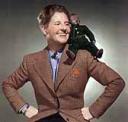Journalists and murderers
 I post today not to report on any books I have finished since my last entry (though I am closing in on Elif Batuman's The Possessed practically as we speak) but because I just finished what felt like a book, Janet Malcolm's piece "Iphigenia in Forest Hills" in the May 3 edition of The New Yorker. The thing was 29 copy-dense New Yorker pages long. I wish there were a word for the nonfiction equivalent of a novella, because that's what it is.
Ostensibly, it's an account of the murder trial of a woman named Mazoltuv Borukhova, who was accused of employing an assassin to kill her estranged husband. Because it's Janet Malcolm it goes off into digressions on the nature of court trials and, especially, on the nature of journalism. Malcolm first came to my attention in 1989 when her two-part piece, "The Journalist and the Murderer," ran in The New Yorker. That piece, later published as a book, recounts the relationship between journalist Joe McGinnis and the subject of his best-selling book, "Fatal Vision," convicted murderer Jeffrey MacDonald. Malcolm's book has a first line many journalists of that era soon learned by heart, especially impressionable 21-year-old aspiring journalists (whether they wanted to or not): "Every journalist who is not too stupid or too full of himself to notice what is going on knows that what he does is morally indefensible."
I post today not to report on any books I have finished since my last entry (though I am closing in on Elif Batuman's The Possessed practically as we speak) but because I just finished what felt like a book, Janet Malcolm's piece "Iphigenia in Forest Hills" in the May 3 edition of The New Yorker. The thing was 29 copy-dense New Yorker pages long. I wish there were a word for the nonfiction equivalent of a novella, because that's what it is.
Ostensibly, it's an account of the murder trial of a woman named Mazoltuv Borukhova, who was accused of employing an assassin to kill her estranged husband. Because it's Janet Malcolm it goes off into digressions on the nature of court trials and, especially, on the nature of journalism. Malcolm first came to my attention in 1989 when her two-part piece, "The Journalist and the Murderer," ran in The New Yorker. That piece, later published as a book, recounts the relationship between journalist Joe McGinnis and the subject of his best-selling book, "Fatal Vision," convicted murderer Jeffrey MacDonald. Malcolm's book has a first line many journalists of that era soon learned by heart, especially impressionable 21-year-old aspiring journalists (whether they wanted to or not): "Every journalist who is not too stupid or too full of himself to notice what is going on knows that what he does is morally indefensible."
OK, so Malcolm views journalism as an ongoing act of seduction and betrayal between subject/source and writer -- but she includes herself in the latter category. And has herself been accused of some ugly behavior, specifically by Jeffrey Masson about a book she wrote on psychiatry, another of her obsessions. To her -- and I think she's right -- it all comes down to constructing narratives. Especially in heavily disputed cases like murder trials, the side with the plausible, authoritative narrative wins. As it happens, that rarely is the defense.
Malcolm's accounts of sitting through a trial are good, especially on the inherent drama of the set-up -- adversarial sides, the judge looming over everything, supposedly impartial although you can frequently sense which attorneys he or she views with favor. And she nails the weird camaraderie that develops among those attending a long trial together -- journalists and court personnel and families of the victim and/or defendant. It's like being shipwrecked, or stuck on an elevator. (Actually I was stuck on an elevator a couple months ago. That was a lot worse.) She is adept at going back and explaining background on the subjects, their community of Bukharan Jews -- who happened to come from Samarkand, Uzbekistan, a place I had never given a second's thought to but that also happens to figure largely in the book I am just finishing, Batuman's "The Possessed." Totally beside the point, but how weird is that? And the piece is worth reading just for the totally unexpected and bizarre left turn it takes (but doesn't follow) after Malcolm's telephone discussion with one of the witnesses. Stuff like that does happen and it rarely gets captured in conventional trial coverage because 1) it doesn't fit in 15 inches of copy and 2) it's not determinative to the trial's progress or outcome.
Malcolm is quite sympathetic to the defense, and honest about it, not that she seems to believe Bukharova is innocent of the charge against her, but because she is clearly the underdog in a system that claims to presume innocence and treat all equally. Malcolm notes several times that the prosecutor refers to Bukharova, a physician, as "Miss" instead of "Dr." Malcolm even calls herself "Ms. Defense Juror," imagining herself as a potential juror during the voir dire phase. (Who cares about the drama of voir dire except people stuck in courtrooms? Kudos to Malcolm for making the process interesting, which it is -- but only about 2 percent of it.)
I enjoyed the piece -- I kept reading all those 30 pages even though I was pretty damned sure about the outcome of the trial -- and I'm a Malcolm fan going back to the Journalist and the Murderer. I especially liked her book on the struggle over Sylvia Plath's legacy and literary reputation, "The Silent Woman." I think of her and Joan Didion as similar writers (I wonder how they'd feel about the comparison? Maybe they'd hate it.) Both are incredibly intelligent, insightful women -- and I think being women matters a lot in their choice of subject matter and approach. Both step back and analyze events that are covered in daily newspapers and other media, but take care to look at the way the stories are perceived, and why. I usually recognize the story they are telling, and realize yes, that was there all along, and I knew it, thank you, thank you for pointing that out. And there's some level at which both are drawing from the journalist's eternal well of newsworthiness: gossip, dirt -- murders, politics, literary celebrity. The fact that they do it in polished prose in places like The New Yorker and the New York Review of Books makes me feel all educated and high-minded while reading it. But it's still dirt.
And yet. This time, I felt just the tiniest bit irritated with Malcolm as she spoke about -- and for -- journalists. She wasn't condescending or nasty about the inkstained wretches who covered the trial and had to file daily for the New York Post, the Daily News, the Times and Forest Hills Ledger. I agree with most of what she said about journalists being more collegial than competitive, and I believe her on the nature of the coverage they produced. I think she ascribes too much malice to the profession in general -- that journalists enjoy torturing people and like covering trials because the attorneys do the torturing for you and all you have to do is write it down. I loved covering trials because of the drama she describes -- and because people were under oath and had to answer uncomfortable questions in a public forum, on the record -- but mostly because the trials you choose to cover generally contain an amazing story -- a great narrative, as Malcolm knows (and it's the reason she was sitting there in that Queens courtroom). I think journalists get off on being in on the story more than torturing their subjects. Maybe Malcolm thinks that's the same thing, but I don't. And I just feel, as a former daily copy toiler myself, a bit resentful at someone from The New Yorker speaking for journalists. It's kind of like a Harvard professor pronouncing about teaching. Well, yes, what you do is teach -- but you do it in conditions that are so far removed from what the vast majority of the profession does that I'm not sure you really get it. I doubt Malcolm ever had to cover a zoning hearing, or worry about coming up with a story for that day no matter if there were something newsworthy that you could have done in seven and a half hours or not, or feel the gut-clenching fear of being assigned to cover some breaking news event and knowing that her job (or at least future advancement prospects) were on the line if she didn't at least match and preferably beat the competition. It's really hard to do that. (I won't even go into whether Malcolm has ever had to cover two murder trials at the same time -- and then get yelled at by the boss because she didn't drop everything to write about the Sports Illustrated Swimsuit Issue having been shot locally. Yes, I'm looking at you, John.) Daily journalism doesn't leave you much time to sit around and ponder the way you're constructing the narrative or the role you're playing in the justice system or society in general.
I guess that's why we have The New Yorker and Malcolm and I'm damned glad we do. I just felt, as she was sitting in the trial sympathizing with the defense that I was sitting there, too -- sympathizing with the daily reporters.
Update: I'm not the only one taking special notice of this story (no surprise, given how self-obsessed media types are) -- here's David Carr's blog post about it in the Times. He argues that Malcolm's identification with Borokhuva's "otherness" is part of the piece, if not its driving motive: "Let’s just say that she may have been one of the reporters covering the trial at the Queens Supreme Court in Kew Gardens last March, but she was not and never has been, part of the press corps."


